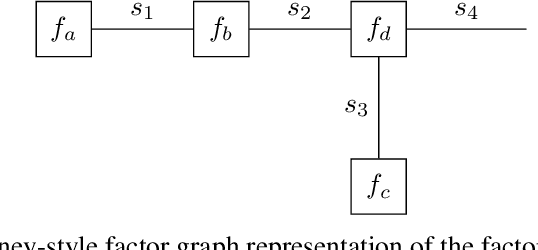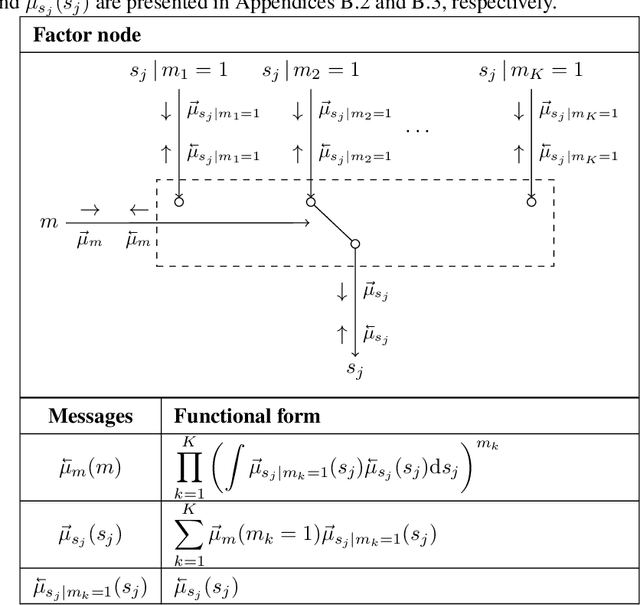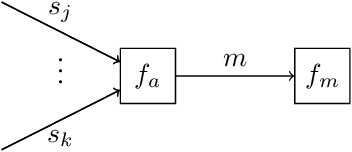Bart van Erp
Expected Free Energy-based Planning as Variational Inference
Apr 21, 2025

Abstract:We address the problem of planning under uncertainty, where an agent must choose actions that not only achieve desired outcomes but also reduce uncertainty. Traditional methods often treat exploration and exploitation as separate objectives, lacking a unified inferential foundation. Active inference, grounded in the Free Energy Principle, offers such a foundation by minimizing Expected Free Energy (EFE), a cost function that combines utility with epistemic drives like ambiguity resolution and novelty seeking. However, the computational burden of EFE minimization has remained a major obstacle to its scalability. In this paper, we show that EFE-based planning arises naturally from minimizing a variational free energy functional on a generative model augmented with preference and epistemic priors. This result reinforces theoretical consistency with the Free Energy Principle, by casting planning itself as variational inference. Our formulation yields optimal policies that jointly support goal achievement and information gain, while incorporating a complexity term that accounts for bounded computational resources. This unifying framework connects and extends existing methods, enabling scalable, resource-aware implementations of active inference agents.
Improved Depth Estimation of Bayesian Neural Networks
Oct 15, 2024Abstract:This paper proposes improvements over earlier work by Nazareth and Blei (2022) for estimating the depth of Bayesian neural networks. Here, we propose a discrete truncated normal distribution over the network depth to independently learn its mean and variance. Posterior distributions are inferred by minimizing the variational free energy, which balances the model complexity and accuracy. Our method improves test accuracy on the spiral data set and reduces the variance in posterior depth estimates.
Automating Model Comparison in Factor Graphs
Jun 09, 2023



Abstract:Bayesian state and parameter estimation have been automated effectively in the literature, however, this has not yet been the case for model comparison, which therefore still requires error-prone and time-consuming manual derivations. As a result, model comparison is often overlooked and ignored, despite its importance. This paper efficiently automates Bayesian model averaging, selection, and combination by message passing on a Forney-style factor graph with a custom mixture node. Parameter and state inference, and model comparison can then be executed simultaneously using message passing with scale factors. This approach shortens the model design cycle and allows for the straightforward extension to hierarchical and temporal model priors to accommodate for modeling complicated time-varying processes.
Principled Pruning of Bayesian Neural Networks through Variational Free Energy Minimization
Oct 17, 2022



Abstract:Bayesian model reduction provides an efficient approach for comparing the performance of all nested sub-models of a model, without re-evaluating any of these sub-models. Until now, Bayesian model reduction has been applied mainly in the computational neuroscience community. In this paper, we formulate and apply Bayesian model reduction to perform principled pruning of Bayesian neural networks, based on variational free energy minimization. This novel parameter pruning scheme solves the shortcomings of many current state-of-the-art pruning methods that are used by the signal processing community. The proposed approach has a clear stopping criterion and minimizes the same objective that is used during training. Next to these theoretical benefits, our experiments indicate better model performance in comparison to state-of-the-art pruning schemes.
AIDA: An Active Inference-based Design Agent for Audio Processing Algorithms
Jan 10, 2022



Abstract:In this paper we present AIDA, which is an active inference-based agent that iteratively designs a personalized audio processing algorithm through situated interactions with a human client. The target application of AIDA is to propose on-the-spot the most interesting alternative values for the tuning parameters of a hearing aid (HA) algorithm, whenever a HA client is not satisfied with their HA performance. AIDA interprets searching for the "most interesting alternative" as an issue of optimal (acoustic) context-aware Bayesian trial design. In computational terms, AIDA is realized as an active inference-based agent with an Expected Free Energy criterion for trial design. This type of architecture is inspired by neuro-economic models on efficient (Bayesian) trial design in brains and implies that AIDA comprises generative probabilistic models for acoustic signals and user responses. We propose a novel generative model for acoustic signals as a sum of time-varying auto-regressive filters and a user response model based on a Gaussian Process Classifier. The full AIDA agent has been implemented in a factor graph for the generative model and all tasks (parameter learning, acoustic context classification, trial design, etc.) are realized by variational message passing on the factor graph. All verification and validation experiments and demonstrations are freely accessible at our GitHub repository.
Active Inference and Epistemic Value in Graphical Models
Sep 01, 2021



Abstract:The Free Energy Principle (FEP) postulates that biological agents perceive and interact with their environment in order to minimize a Variational Free Energy (VFE) with respect to a generative model of their environment. The inference of a policy (future control sequence) according to the FEP is known as Active Inference (AIF). The AIF literature describes multiple VFE objectives for policy planning that lead to epistemic (information-seeking) behavior. However, most objectives have limited modeling flexibility. This paper approaches epistemic behavior from a constrained Bethe Free Energy (CBFE) perspective. Crucially, variational optimization of the CBFE can be expressed in terms of message passing on free-form generative models. The key intuition behind the CBFE is that we impose a point-mass constraint on predicted outcomes, which explicitly encodes the assumption that the agent will make observations in the future. We interpret the CBFE objective in terms of its constituent behavioral drives. We then illustrate resulting behavior of the CBFE by planning and interacting with a simulated T-maze environment. Simulations for the T-maze task illustrate how the CBFE agent exhibits an epistemic drive, and actively plans ahead to account for the impact of predicted outcomes. Compared to an EFE agent, the CBFE agent incurs expected reward in significantly more environmental scenarios. We conclude that CBFE optimization by message passing suggests a general mechanism for epistemic-aware AIF in free-form generative models.
 Add to Chrome
Add to Chrome Add to Firefox
Add to Firefox Add to Edge
Add to Edge